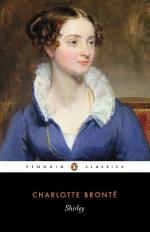|
This section contains 6,447 words (approx. 22 pages at 300 words per page) |

|
SOURCE: "Shirley: The Eternal Feminine," in Charlotte Brontë: A Psychosexual Study of Her Novels, Victor Gollancz Ltd., 1973, pp. 78-95.
In the following excerpt, Burkhart claims that, despite the novel's faults, its title character succeeds as a forerunner of today's liberated women.
Voices Public and Private
The habit among Victorian writers of addressing the reader directly was based on the assumptions that reader and writer shared a common background and common beliefs and that the writer's duty was rather more to instruct than to delight. When an author felt his audience becoming inattentive or alienated, he tended to raise his voice, in insistent vocative; Victorian prophets like Carlyle or Ruskin are often a strident group. If Charlotte Brontë is strident in Shirley, however, and now conceives of herself as interpreter, mentor, and guide, the more specific cause was that Jane Eyre's success had gone to her head, and, accustomed...
|
This section contains 6,447 words (approx. 22 pages at 300 words per page) |

|


